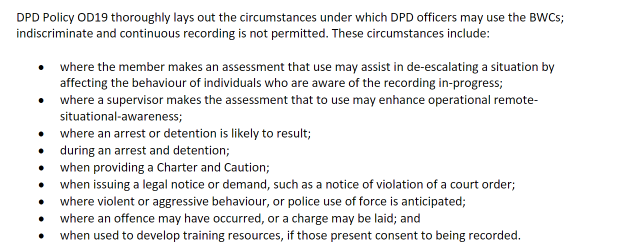Residents of Delta will soon see more police officers out and about with body-worn cameras as the Delta Police Department (DPD) adds to its testing of the gear.

The municipal force announced Monday it will buy four more cameras and related equipment for patrol officers at an estimated cost of $6,400. The six-month pilot is expected to begin in February.
The move was approved by the Delta Police Board last Wednesday, building on pilots with the interdiction team and traffic section that began in May 2021.

The department said community consultations found 93.3 per cent of respondents supported expanding the camera program to front-line officers in the city.
“We have heard loud and clear that our community strongly supports and expects DPD officers to wear BWCs (body-worn cameras),” Delta Mayor and police board chair George Harvie said in a statement.

Get daily National news
“The community’s feedback was key in the Board’s decision to approve the Patrol pilot, making it the first time in BC that a frontline Patrol/General Duty Section will deploy BWCs. Our decision focuses on fostering community trust in police while allowing officers to do their job safely.”
The DPD said cameras will help build public trust, discourage use of force against and by police, de-escalate high conflict situations, help resolve complaints against officers, and assist with training and evidence collection.
The cameras will be used under the provincial government’s policing standards for body-worn cameras, as well as the Delta Police Department’s own policy.
Under that policy, police will not record footage indiscriminately or continuously with the cameras, but are instead authorized to activate them in the following circumstances:

That same policy also restricts who can see the footage the cameras collect.
According to the police force, footage will only be available to a file’s investigating officer, their supervisor or “others with an investigative or documented need to see the footage.”
The footage will be stored in DEMS, a central digital evidence management system municipal police departments will soon be legally required to use. The department said the use of this storage will also help defray some of the costs of running the system.

Earlier this month, Vancouver city council voted to move ahead with body-worn cameras for front-line officers. Staff have been directed to assess costs and develop a plan for the cameras by 2024, with the goal of full implementation by 2025.
Police in Toronto and Calgary have already moved to equip front-line officers with body-worn cameras, and the RCMP is preparing to roll out 12,500 cameras across 700 detachments, starting with a field test of 300 units in three divisions.
Both the Canadian Civil Liberties Association and the B.C. Civil Liberties Association (BCCLA) have raised concerns about the cameras, primarily citing surveillance and privacy.
“What’s the pressing objective and what is the evidence that they can actually meet that policy objective?” lawyer and BCCLA policy director Meghan McDermott told Global News in an interview earlier this month about the Vancouver police program.
“There is high potential for people’s personal information to become known to the state and then shared within agencies.”








Comments
Comments closed.
Due to the sensitive and/or legal subject matter of some of the content on globalnews.ca, we reserve the ability to disable comments from time to time.
Please see our Commenting Policy for more.